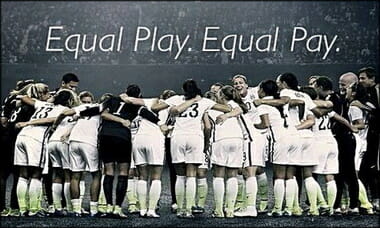Larry Elder destroys the wide-spread myth regarding the idea that the women’s soccer team is paid less than their male counterparts. The callers point was simple and powerful, in essense he was saying how could someone demand equal pay when they were chasing away viewers — which — lowers revenue. Rapinoe is solely responsible for the women’s soccer ratings to sink by 43% this year. The “Sage” also reads from a couple articles zeroing in on the lie (or myth if you like) of this position (they follow the video):
Here are the articles:
- Women’s Soccer Players Say They Deserve ‘Equal Pay.’ But The Stats Show That They Are Actually Overpaid;
- About That Alleged World Cup Pay Gap;
- Here’s Why The Women’s Soccer Team Isn’t Paid As Much As The Men’s;
- Here Is the Giant Pay Disparity Between The U.S. Women’s National Team Winning The World Cup Vs. The Men.
Here is the best comment from my YouTube Channel:
- Please do a video review on the video what about the gender work place hours gap. The Average crowd for the National Women’s Soccer Leauge was 5,464 The Average Crowd for the Men’s MSL was 21,875. The Women’s season was 49 matches and the Men’s Season was 391 matches. Tickets were cheaper for the Women’s matches. The USA women’s team lost by 5 goals to 2 to an Under 15 boys team. The Australian National Women’s soccer team also lost by 7 goals to 0 to the Newcastle Jets Under 15 boys team.
Older Videos:
Christian Hoff Sommers
MISES INSTITUTE
(MISES) …At Forbes, Mike Ozanian note that generally speaking, men’s soccer generates revenues at much higher levels:
The men’s World Cup in Russia generated over $6 billion in revenue, with the participating teams sharing $400 million , less than 7% of revenue. Meanwhile, the Women’s World Cup is expected to earn $131 million for the full four-year cycle 2019-22 and dole out $30 million to the participating teams.
But what about the US women’s team specifically?
According to the Wall Street Journal:
From 2016 to 2018, women’s games generated about $50.8 million in revenue compared with $49.9 million for the men, according to U.S. soccer’s audited financial statements. In 2016, the year after the World Cup, the women generated $1.9 million more than the men. Game revenues are made up mostly of ticket sales. In the last two years, at least, the men’s tally includes appearance fees that opposing teams pay the U.S. for games.
So, very recently, women have begun to outpace the men in ticket sales. But, as the WSJ admits: “ticket sales are only one revenue stream that the national teams help generate.”
And what about revenues from broadcasts? It seems that “TV ratings for U.S. men’s games tend to be higher than those for U.S. women’s games, according to data collected by U.S. Soccer.”
Moreover, Politifact was unable to confirm that total revenue is, in fact, higher for the women in recent years:
During the three years following the 2015 Women’s World Cup, the women’s team brought in slightly more revenue from games than the men’s team did. While marketing and sponsorships are sold as a bundle, there are anecdotal signs that the women’s brand is surging in popularity.
However, it’s harder to say whether the women are ultimately paid less than the men, due to the lack of transparency and the complicated variables that feed into the compensation. Several experts said the reality may be murkier than a shouted catchphrase [i.e., “equal pay!”] can capture.
For the sake of argument, let’s say the women do bring in more revenue. The fact this is such a recent development would help explain why the pay structure has yet to catch up with revenues. Moreover, if US Soccer is going to risk paying out-sized salaries and benefits, it’s going to have to first be comfortable that the women’s teams are a reliable and sustainable revenue source….
Biology 7 — Sociology 0
 The Matildas were missing several established internationals on Wednesday night, including star striker Kyah Simon. They also rotated players more than usual, which contributed to a lack of cohesion. However, there is no denying losing to a team of school boys is far from ideal preparation for the world’s fifth ranked team in their quest for Olympic gold at Rio. The following is with a H/T to GAY PATRIOT [now – sadly – defunt], and is from RACONTEUR REPORT
The Matildas were missing several established internationals on Wednesday night, including star striker Kyah Simon. They also rotated players more than usual, which contributed to a lack of cohesion. However, there is no denying losing to a team of school boys is far from ideal preparation for the world’s fifth ranked team in their quest for Olympic gold at Rio. The following is with a H/T to GAY PATRIOT [now – sadly – defunt], and is from RACONTEUR REPORT
More proof that no one in the Pentagon or DoD can read:
A team of 14 year old boys kicked the asses of the Oz Women’s Olympic Team, the latter being ranked as one of the Top 5 women’s teams headed to the 2016 Olympics in Rio this summer.
Australia’s national women’s soccer team have suffered a devastating defeat in the lead up to the Rio Olympics – going down 7-0 to the Newcastle Jets under-15 boys side.
Despite the embarrassing defeat on Wednesday night at Valentine Sports Park in Newcastle, the Australian team will travel to Brazil as one of the gold medal favourites.
While the Matildas played with a rotating squad, there is no denying losing to a team of school boys is far from ideal preparation for the world’s fifth ranked team in their quest for Olympic gold at Rio.
[….]
And I don’t know the IOOC policy on dudes who “identify” as women, but if you can find a dozen or so gender-bender boys about 14-15 years old, and get them entered in Women’s Soccer at this years’ Olympics, they’ll have a pretty easy shot at the medal round.
Just saying.




